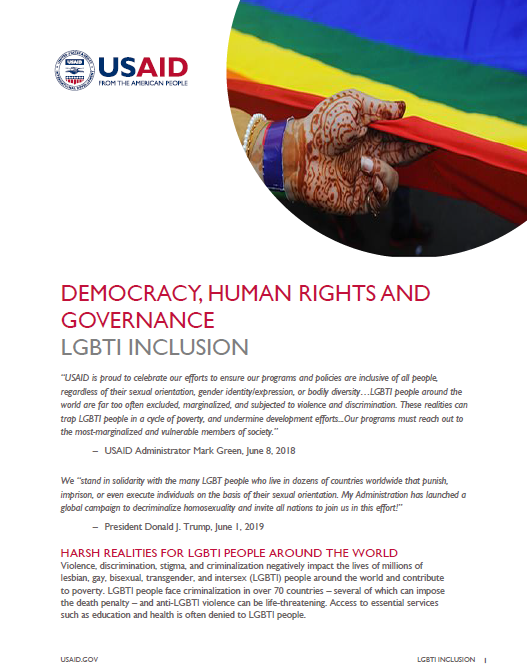Speeches Shim
HARSH REALITIES FOR LGBTI PEOPLE AROUND THE WORLD
Violence, discrimination, stigma, and criminalization negatively impact the lives of millions of lesbian, gay, bisexual, transgender, and intersex (LGBTI) people around the world and contribute to poverty. LGBTI people face criminalization in over 70 countries – several of which can impose the death penalty – and anti-LGBTI violence can be life-threatening. Access to essential services such as education and health is often denied to LGBTI people.
INCLUSIVE DEVELOPMENT
Inclusion is one of USAID’s core values. USAID promotes a nondiscriminatory and inclusive approach to development that ensures that all people – including those who face discrimination and thus may have limited access to a country’s benefits, legal protections, or social participation – are fully included and can participate in and benefit from development processes and activities.
LGBT VISION FOR ACTION
To help operationalize this inclusive development approach USAID released the LGBT Vision for Action, a document that reflects USAID’s commitment to protect LGBTI people from violence and discrimination and advance their human rights. The LGBT Vision for Action establishes the following engagement principles: 1) account for country and cultural context, 2) ensure openness and safety for dialogue, 3) integrate LGBTI issues into USAID’s work, 4) support LGBTI communities, and 5) build partnerships and create allies and champions.
LGBTI INCLUSION EFFORTS
USAID has a long history of advancing human rights through support and assistance to marginalized and vulnerable populations. We support the human rights of LGBTI people through the integration of inclusion and nondiscrimination principles into our policies and programming, and through programs that specifically address anti-LGBTI violence and discrimination. USAID’s approach includes 1) data collection/research to influence policy, 2) social/behavior change communications to reduce stigma, 3) country-level projects to respond to real-time needs – particularly in the “most difficult” countries, and 4) emergency response grants. Programmatic examples include a) the Human Rights Grants Program, which helps respond to urgent or unanticipated human rights challenges, including those related to violence and discrimination faced by LGBTI people; and b) the LGBTI Global Development Partnership, which leverages the financial and technical contributions of corporations, bilateral donors, foundations, nongovernmental organizations, and universities to help protect LGBTI people from violence and discrimination in 14 developing countries.
THE ECONOMIC BENEFITS OF LGBTI INCLUSION
A USAID-supported report on “The Relationship between LGBT Inclusion and Economic Development” showed a clear positive correlation between GDP per capita and legal rights for LGBTI people. Each additional legal right for LGBTI people is correlated with a $320 increase in GDP per capita, and the presence of an LGBTI-inclusive anti-discrimination law is correlated with a $1,763 increase in GDP per capita. Similar studies in India and Indonesia estimate that lost workplace productivity and health problems associated with LGBTI exclusion cost the country up to 1.7 percent and 1.4 percent of GDP, respectively.


Comment
Make a general inquiry or suggest an improvement.